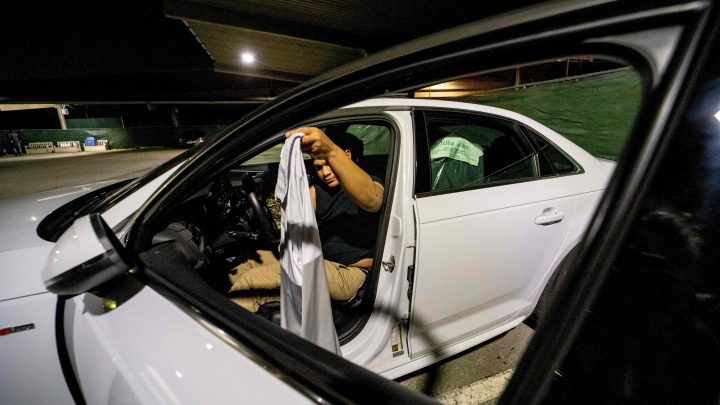
Safe parking programs are difficult to fund, but sorely needed
Safe parking programs are difficult to fund, but sorely needed

On Thursday, House lawmakers will unveil bipartisan legislation to use federal dollars to pay for neighborhood programs that provide safe places to park for people who are living in their vehicles.
These programs have existed in some form or another for two decades, but they have had to cobble together funding, making them difficult to expand — even as the need for assistance for unhoused people has skyrocketed.
Advocates say people living in vehicles often have not yet experienced the worst of homelessness, but they still need a lot of help to prevent them from sliding further into the margins of society.
“No one ever wanted to be homeless. But as long as I had a van, I didn’t call myself homeless,” said 72-year-old Jan, who asked that we only use her first name.
Jan was without a permanent home for 10 years after retiring from a graphic design career and burning through her savings while living in Santa Barbara, a California enclave with a serious affordable housing shortage.
“Out on the streets, you know, my van was broken into a few times, laptops, phones were taken, always looking for a place to park where no one would bother me,” she said.
Jan eventually found New Beginnings, a non-profit that runs a number of homeless programs, including a monitored overnight parking program. The parking spots are often at donated church-owned lots, where there’s also a bathroom, and sometimes a place to shower or a place to do laundry.
“Probably at least 50%, maybe even slightly higher of the people that are enrolled in the safe parking program are senior citizens,” said Cora Patton, a case manager at New Beginnings. “We’ve also had a huge influx of families with small children.”
New Beginnings pioneered the idea of providing overnight parking 20 years ago. Others around the country are trying to replicate it. But the organization’s Executive Director Kristine Schwarz says there’s often a major barrier.
“One of the first questions that we receive from people who reach out for technical assistance is how do you pay for this. There is no dedicated funding for this kind of population,” she said.
That’s because the Department of Housing and Urban Development can only fund physical shelters.
Democratic Congressman Salud Carbajal — along with two fellow California lawmakers, a Republican and a Democrat — plans to introduce a bill next week to change the rules.
“My goal is to create a sense of support and bipartisanship so that people clearly understand that it benefits us all, to help intervene, those that find themselves in this circumstance,” he said.
Carbajal has tried to federally fund safe parking programs before, without success. This time, he’s not asking for new funding, but the ability to redirect existing money.
It costs more to get people back on their feet. So it’s cost-effective to be able to intervene and provide this service and program before people become fully homeless.
Intervene, because safe parking also comes with other help, as it did for Jan.
“New Beginnings, they found me an apartment,” she said. “I’ve been here almost three years now. It’s like I was given life back.”
New Beginnings says its parking program costs a fraction of what it spends on aiding the homeless population at large.
There’s a lot happening in the world. Through it all, Marketplace is here for you.
You rely on Marketplace to break down the world’s events and tell you how it affects you in a fact-based, approachable way. We rely on your financial support to keep making that possible.
Your donation today powers the independent journalism that you rely on. For just $5/month, you can help sustain Marketplace so we can keep reporting on the things that matter to you.











